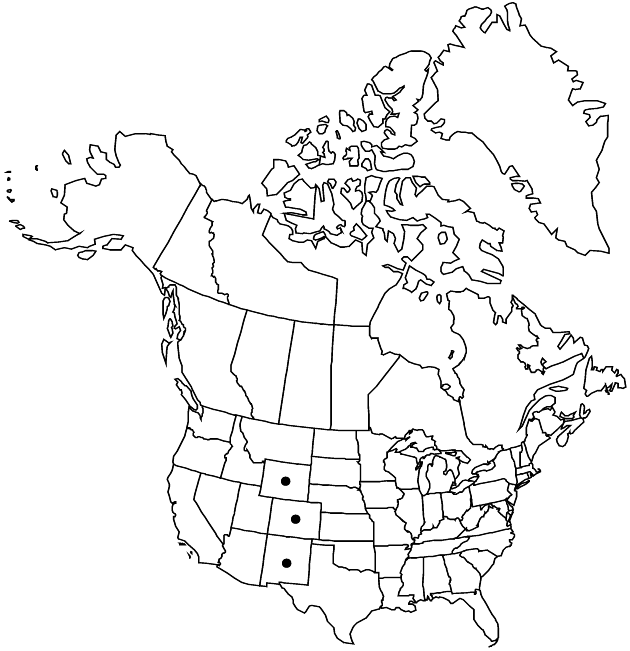Difference between revisions of "Symphyotrichum porteri"
Phytologia 77: 289. 1995.
FNA>Volume Importer |
imported>Volume Importer |
||
| (6 intermediate revisions by 2 users not shown) | |||
| Line 8: | Line 8: | ||
}} | }} | ||
|common_names=Porter’s or smooth white aster | |common_names=Porter’s or smooth white aster | ||
| − | |basionyms={{Treatment/ID/ | + | |special_status={{Treatment/ID/Special_status |
| + | |code=E | ||
| + | |label=Endemic | ||
| + | }} | ||
| + | |basionyms={{Treatment/ID/Basionym | ||
|name=Aster porteri | |name=Aster porteri | ||
|authority=A. Gray | |authority=A. Gray | ||
| + | |rank=species | ||
| + | |publication_title=Notes Compositae, | ||
| + | |publication_place=99. 1880 | ||
}} | }} | ||
|synonyms={{Treatment/ID/Synonym | |synonyms={{Treatment/ID/Synonym | ||
|name=Aster ericoides var. strictus | |name=Aster ericoides var. strictus | ||
|authority=Porter | |authority=Porter | ||
| + | |rank=variety | ||
}} | }} | ||
|hierarchy=Asteraceae;Asteraceae tribe Astereae;Symphyotrichum;Symphyotrichum subg. Symphyotrichum;Symphyotrichum sect. Symphyotrichum;Symphyotrichum porteri | |hierarchy=Asteraceae;Asteraceae tribe Astereae;Symphyotrichum;Symphyotrichum subg. Symphyotrichum;Symphyotrichum sect. Symphyotrichum;Symphyotrichum porteri | ||
| Line 30: | Line 38: | ||
|elevation=1800–2900 m | |elevation=1800–2900 m | ||
|distribution=Colo.;N.Mex.;Wyo. | |distribution=Colo.;N.Mex.;Wyo. | ||
| − | |discussion=<p>Symphyotrichum porteri is the only western member of subsect. Porteriana; it grows in the foothills of the Rocky Mountains.</p> | + | |discussion=<p><i>Symphyotrichum porteri</i> is the only western member of subsect. Porteriana; it grows in the foothills of the Rocky Mountains.</p> |
|tables= | |tables= | ||
|references= | |references= | ||
| Line 39: | Line 47: | ||
-->{{#Taxon: | -->{{#Taxon: | ||
name=Symphyotrichum porteri | name=Symphyotrichum porteri | ||
| − | |||
|authority=(A. Gray) G. L. Nesom | |authority=(A. Gray) G. L. Nesom | ||
|rank=species | |rank=species | ||
| Line 53: | Line 60: | ||
|publication title=Phytologia | |publication title=Phytologia | ||
|publication year=1995 | |publication year=1995 | ||
| − | |special status= | + | |special status=Endemic |
| − | |source xml=https:// | + | |source xml=https://bitbucket.org/aafc-mbb/fna-data-curation/src/2e0870ddd59836b60bcf96646a41e87ea5a5943a/coarse_grained_fna_xml/V19-20-21/V20_1144.xml |
|tribe=Asteraceae tribe Astereae | |tribe=Asteraceae tribe Astereae | ||
|genus=Symphyotrichum | |genus=Symphyotrichum | ||
Latest revision as of 19:59, 5 November 2020
Perennials, 10–50 cm, cespitose; usually with branched caudices, sometimes long-rhizomatous. Stems 1–4+, ascending to erect (straight), glabrous. Leaves thin, margins usually entire, sometimes very sparsely serrulate distally, scabrous, apices acute, mucronulate, faces glabrous; basal usually deciduous at flowering (new winter rosettes developed by flowering), petiolate (petioles narrow or ± winged, then appearing sessile, slightly sheathing, ciliate), blades oblanceolate to obovate or spatulate, 5–45+ × 2–6 mm, cuneate, apices obtuse; proximal cauline usually withering by flowering, petiolate or sessile (petioles winged, slightly clasping, ciliate), blades oblanceolate or lanceolate to linear-oblanceolate or -lanceolate, 40–80(–90) × 2–5(–6) mm, bases cuneate; distal sessile, blades linear-lanceolate to linear, ± falcate, 8–60 × 0.5–3 mm, reduced distally, bases cuneate to rounded-cuneate. Heads in paniculiform arrays, branches ascending, ± densely leafy with narrow branch leaves. Peduncles 0.2–2.8 cm, bracteate, glabrous, bracts 1–3, linear to linear-lanceolate. Involucres campanulate to cylindro-campanulate, 3.6–5(–6) mm. Phyllaries in 4–6 series, linear-lanceolate to -oblanceolate (outer) or oblong-lanceolate (inner), unequal, bases indurate 1/4–3/4 (sometimes outermost foliaceous), margins proximally narrowly scarious, erose, hyaline, distally ciliolate, green zones lanceolate, apices acute, ± spreading, involute, mucronulate, faces glabrous. Ray florets (12–)20–34(–42); corollas usually white, seldom pinkish, laminae 6.8–12 × 0.7–1.8 mm. Disc florets (30–)40–75(–103); corollas pale yellow becoming pink and later brown, (2.8–)3.1–3.9(–4.9) mm, tubes much shorter than narrowly funnelform throats, lobes triangular, (0.3–)0.5–0.7(–0.8) mm. Cypselae purple to stramineous, obovoid to oblanceoloid, compressed, 1–2 mm, 4–5-nerved, faces sparsely, finely strigillose; pappi white, 1.2–3.5 mm. 2n = 16.
Phenology: Flowering late Jul–Sep.
Habitat: Lower montane
Elevation: 1800–2900 m
Distribution

Colo., N.Mex., Wyo.
Discussion
Symphyotrichum porteri is the only western member of subsect. Porteriana; it grows in the foothills of the Rocky Mountains.
Selected References
None.